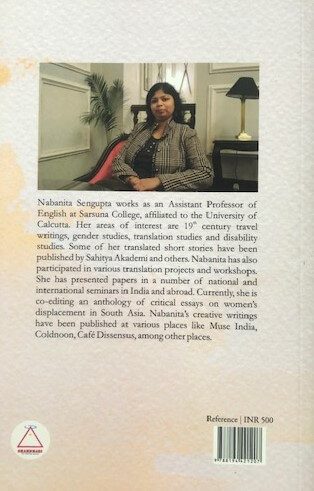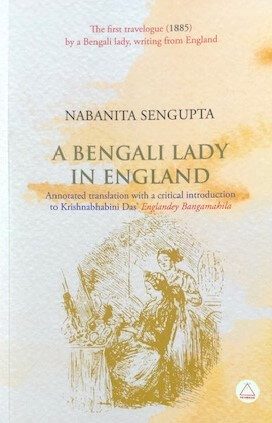Reading Time: 6 minutes
Gopal reviews Nabanita Sengupta’s translation of Krishnabhavini Das’ book, A Bengali Lady in England. He also critiques Das’ book, ‘Englandey Bangamahila’. An exclusive for Different Truths.

Translated Book:A Bengali Lady in England
Author: Krishnabhavini Das
Translator: Nabanita Sengupta
Publisher: Shambhabi, the Third Eye Imprint, Kolkata/ New Delhi.
How brave it was for Krishnabhavini Das, to refuse the opportunity, to be in a comfortable life! She instead made her most ambitious piece to date a deep exploration of the culture, femininity, and lifestyle of British people. She accompanies her husband to London. And studied in detail the cultural differences between the Indians and the Britishers.
Her observations were published as a travel piece in Bengali, titled ‘Englandey Bangamahila’, in 1885.
Her observations were published as a travel piece in Bengali, titled ‘Englandey Bangamahila’, in 1885. Later, the British government barred it, as its content was thought to be dangerous by the authorities.
Wonderful Exposition
The best travelogues are often a discovery of form. A wonderful exposition of becoming. A series of departures measured out against the journey and traditions of culture and ethos. The travel narrative with anecdotes and idiosyncrasies exposes the writer’s personality. A directness that fiction or poetry seldom has.
This bookevokes a time plane where travel isn’t so fraught.
This bookevokes a time plane where travel isn’t so fraught. And strangers can get close to learn something about themselves and the cultural contexts.
Vivid Immediacy
It is true that translation is a process of disseminating cultures. Clarity of explanation is obviously critical. It’s important to give a context when needed. Nabanita Sengupta, an author, poet, and academician, in her recent English translation of Das’ book, ‘A Bengali Lady in England’, depicts 19th century London in all its vivid immediacy.
The narrative is constantly in dialogue with its own era. It’s shaped and created by the lifestyle, politics, culture, and economics of the British people. Her annotated translation with a critical introduction makes this book a delightful read.
Translating Krishnabhabini Das
“While translating Krishnabhabini Das’ Englandey Bangamahila’, I have tried to keep my text as close to the original as possible. But given the fact that, that English and Bengali belong to two different language systems and follow vastly different syntax, it has not been possible to maintain a verbatim translation at all the places.” Nabanita stated in her Introduction.
Here the translator finds her vein of expression by attending to the minute details.
Nabanita has also explained, “I have tried my best to act as the facilitator between the two language systems and interpret the culturally opaque terms to the target readers.” Here the translator finds her vein of expression by attending to the minute details. And she offers new space that goes beyond the existing.
She provides a rich fare for readers, which is indeed a rare treat.
Positive and Adverse Aspects
Das had pointed out in her Foreword, “Here I have penned down both the positive and adverse aspects of the British people according to my experiences. I have tried to present an impartial description of their lifestyle here, not considering them when they are abroad, particularly in India.”
Although first-person in nature, Krishnabhabini Das seldom speaks about her personal life…
Although first-person in nature, Krishnabhabini Das seldom speaks about her personal life in London. She intends a sense of history, listening and talking to herself in this travelogue. She has carefully drawn images of the closeted and greedy life of the common British people with skill and attention.
“Everybody in England seems to worship selfishness. They look for their profit always and at all costs. They will never do anything unless it benefits them and once they find any prospect of profit, they will accomplish it at all costs. They believe that all other countries and races of this world exist to fulfil their desires.”

First Bengali Woman
She is the first Bengali woman to write about the British lives in England from her own understanding. And she beautifully conjures a sense of place. Remarkable!
She has covered the cultural landscape of British people…
She has covered the cultural landscape of British people along the lines of social class, industrial development, and material hardship. Extensively and intimately. Not overtly satirised or exaggerated. The surface details are deeply considered and equally pertinent, even now. Sometimes, the writer squeezes into the gaps of realism. And she paints a picture of something beautiful and refreshing in natural surroundings.
“While strolling through the fields you might face a short spell of rain every couple of hours. But the landscape looks so beautiful after the shower that we are not bothered by that inconvenience. The grass looks fresher and greener. On tiny leaves, there are shining water droplets just about to trickle down, looking like bright pearl strings.as the sunrays-emerges from the clouds, the fields look brighter.”
Conviction and Compassion
Throughout, the author shows a rare dedication to her viewpoints. She retains a firm conviction and compassion. Her sentences effortlessly encompass the humdrum and the metaphysical alike. The ordinariness feels fresh, while the oddity rings true. The common thread through the narrative, the urge to organise reality’s randomness, trades in firmness and certainty. Even her quirky opinion on Indian Freedom Movement has that resoluteness.
She raises various pertinent issues like industrial development, trade, migration, asylum…
She raises various pertinent issues like industrial development, trade, migration, asylum, immigration, religious oppression and much else. She even concludes, “…the ability to work is a gift of God and it is this gift which has enabled the British to undertake all difficult and arduous tasks.” This emotional force is undimmed till the end.
Clarity of Explanation
Clarity of explanation is always crucial. And it’s important to give context. With her clear-eyed vision and razor-sharp mind, the author explores a detailed account of life in 19th century England. Her thoughts are always on time. And the changes are subtly interwoven, as she compares the condition of Indian women with their British counterparts.
She writes, “But in India, let alone spinsters, even the married women do not come forward to serve the country. British women, even if they remain single or become widows, do not consider their lives to be futile. They try their best to do their duties as human beings.”
She adds, “Instead of being apprehensive, if they (read men) properly educate women prior to giving them freedom, then we shall realise that Indian women are in no way inferior to the British ones.”
Period of Uncertainty
Not everything in British lives is hunky dory. She also expresses concern about the great period of uncertainty for the natural world. The industrial revolution begins to change life beyond recognition. She even talks about the environmental pollution in ‘black country’ in England, where coal and iron, (two most polluted ingredients) are mined (one feels like running away from this patalpuri). These immensely contribute to the prosperity of the country.
The book is appealing to the end. It’s an imaginative work.
The book is appealing to the end. It’s an imaginative work. Das writes in a way that is elaborate and witty. She shows how simple, yet significant human relationships are. She infuses her prose with tender details, never taking her eye off the inevitable endings, interwoven into human destiny.
Rural Life
There is a nod to rural life. And to the myths that connect people to their land. These shape their sense of time and destiny. The translator has done an astonishing job. The language reads so brightly and distinctively. And yet not to interrupt the flow or make it self-conscious. This deeply conveyed and revealing book with a rich narrative that rewards patience.
The book’s ‘Last Words’ ends with a poem, ending in raging fire within heart.
The book’s ‘Last Words’ ends with a poem, ending in raging fire within heart. It is well worth reading on its own. The things are much more real than echoes. And the writer intends, as if a sense of history, listening and talking to itself with startling originality.
Seven hundred years float in tears Staying in Swadesh under Videshi rule Cannot any more bear your anguish. Within India lie flames of grief…….
The cover design of the book is attractive. ‘A Bengali Lady in England’ is an unforgettable book, which is an act of catharsis. At the same time, it is attuned to the tiniest shifts in perception and longing. It has a generous spirit that can be a much-needed balm in these difficult times. A must for every bookshelf.
Photos sourced by the reviewer

















